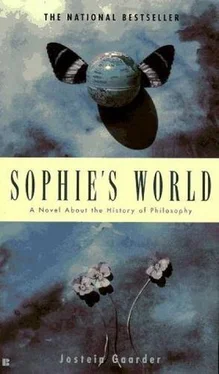Jostein Gaarder - Sophie's World - A Novel About the History of Philosophy
Здесь есть возможность читать онлайн «Jostein Gaarder - Sophie's World - A Novel About the History of Philosophy» весь текст электронной книги совершенно бесплатно (целиком полную версию без сокращений). В некоторых случаях можно слушать аудио, скачать через торрент в формате fb2 и присутствует краткое содержание. ISBN: , Издательство: BERKLEY BOOKS, NEW YORK, Жанр: Философия, на английском языке. Описание произведения, (предисловие) а так же отзывы посетителей доступны на портале библиотеки ЛибКат.
- Название:Sophie's World: A Novel About the History of Philosophy
- Автор:
- Издательство:BERKLEY BOOKS, NEW YORK
- Жанр:
- Год:неизвестен
- ISBN:0-425-15225-1
- Рейтинг книги:4 / 5. Голосов: 1
-
Избранное:Добавить в избранное
- Отзывы:
-
Ваша оценка:
- 80
- 1
- 2
- 3
- 4
- 5
Sophie's World: A Novel About the History of Philosophy: краткое содержание, описание и аннотация
Предлагаем к чтению аннотацию, описание, краткое содержание или предисловие (зависит от того, что написал сам автор книги «Sophie's World: A Novel About the History of Philosophy»). Если вы не нашли необходимую информацию о книге — напишите в комментариях, мы постараемся отыскать её.
Sophie's World: A Novel About the History of Philosophy — читать онлайн бесплатно полную книгу (весь текст) целиком
Ниже представлен текст книги, разбитый по страницам. Система сохранения места последней прочитанной страницы, позволяет с удобством читать онлайн бесплатно книгу «Sophie's World: A Novel About the History of Philosophy», без необходимости каждый раз заново искать на чём Вы остановились. Поставьте закладку, и сможете в любой момент перейти на страницу, на которой закончили чтение.
Интервал:
Закладка:
P.S. Thank you for your attention, Sophie. It is not unlikely that you will need to read this chapter two or three times before you understand it all. But understanding will always require some effort. You probably wouldn’t admire a friend who was good at everything if it cost her no effort.
The best solution to the question of basic substance and the transformations in nature must wait until tomorrow, when you will meet Democritus. I’ll say no more!
Sophie sat in the den looking out into the garden through a little hole in the dense thicket. She had to try and sort out her thoughts after all she had read.
It was as clear as daylight that plain water could never turn into anything other than ice or steam. Water couldn’t even turn into a watermelon, because even watermelons consisted of more than just water. But she was only sure of that because that’s what she had learned. Would she be absolutely certain, for example, that ice was only water if that wasn’t what she had learned? At least, she would have to have studied very closely how water froze to ice and melted again.
Sophie tried once again to use her own common sense, and not to think about what she had learned from others.
Parmenides had refused to accept the idea of change in any form. And the more she thought about it, the more she was convinced that, in a way, he had been right. His intelligence could not accept that “something” could suddenly transform itself into “something completely different.” It must have taken quite a bit of courage to come right out and say it, because it meant denying all the natural changes that people could see for themselves. Lots of people must have laughed at him.
And Empedocles must have been pretty smart too, when he proved that the world had to consist of more than one single substance. That made all the transformations of nature possible without anything actually changing.
The old Greek philosopher had found that out just by reasoning. Of course he had studied nature, but he didn’t have the equipment to do chemical analysis the way scientists do nowadays.
Sophie was not sure whether she really believed that the source of everything actually was earth, air, fire, and water. But after all, what did that matter? In principle, Empedocles was right. The only way we can accept the transformations we can see with our own eyes—without losing our reason—is to admit the existence of more than one single basic substance.
Sophie found philosophy doubly exciting because she was able to follow all the ideas by using her own common sense—without having to remember everything she had learned at school. She decided that philosophy was not something you can learn; but perhaps you can learn to think philosophically.
Democritus
…the most ingenious toy in the world…
Sophie put all the typed pages from the unknown philosopher back into the cookie tin and put the lid on it. She crawled out of the den and stood for a while looking across the garden. She thought about what happened yesterday. Her mother had teased her about the “love letter” again at breakfast this morning. She walked quickly over to the mailbox to prevent the same thing from happening today. Getting a love letter two days in a row would be doubly embarrassing.
There was another little white envelope! Sophie began to discern a pattern in the deliveries: every afternoon she would find a big brown envelope. While she read the contents, the philosopher would sneak up to the mailbox with another little white envelope.
So now Sophie would be able to find out who he was. If it was a he! She had a good view of the mailbox from her room. If she stood at the window she would see the mysterious philosopher. White envelopes don’t just appear out of thin air!
Sophie decided to keep a careful watch the following day. Tomorrow was Friday and she would have the whole weekend ahead of her.
She went up to her room and opened the envelope. There was only one question today, but it was even dumber than the previous three:
Why is Lego the most ingenious toy in the world?
For a start, Sophie was not at all sure she agreed that it was. It was years since she had played with the little plastic blocks. Moreover she could not for the life of her see what Lego could possibly have to do with philosophy.
But she was a dutiful student. Rummaging on the top shelf of her closet, she found a bag full of Lego blocks of all shapes and sizes.
For the first time in ages she began to build with them. As she worked, some ideas began to occur to her about the blocks.
They are easy to assemble, she thought. Even though they are all different, they all fit together. They are also unbreakable. She couldn’t ever remember having seen a broken Lego block. All her blocks looked as bright and new as the day they were bought, many years ago. The best thing about them was that with Lego she could construct any kind of object. And then she could separate the blocks and construct something new.
What more could one ask of a toy? Sophie decided that Lego really could be called the most ingenious toy in the world. But what it had to do with philosophy was beyond her.
She had nearly finished constructing a big doll’s house. Much as she hated to admit it, she hadn’t had as much fun in ages.
Why did people quit playing when they grew up?
When her mother got home and saw what Sophie had been doing, she blurted out, “What fun! I’m so glad you’re not too grown up to play!”
“I’m not playing!” Sophie retorted indignantly, “I’m doing a very complicated philosophical experiment!”
Her mother signed deeply. She was probably thinking about the white rabbit and the top hat.
When Sophie got home from school the following day, there were several more pages for her in a big brown envelope. She took them upstairs to her room. She could not wait to read them, but she had to keep her eye on the mailbox at the same time.
THE ATOM THEORY
Here I am again, Sophie. Today you are going to hear about the last of the great natural philosophers. His name is Democritus (c. 460-370 B.C.) and he was from the little town of Abdera on the northern Aegean coast.
If you were able to answer the question about Lego blocks without difficulty, you should have no problem understanding what this philosopher’s project was.
Democritus agreed with his predecessors that transformations in nature could not be due to the fact that anything actually “changed.” He therefore assumed that everything was built up of tiny invisible blocks, each of which was eternal and immutable. Democritus called these smallest units atoms.
The word “a-tom” means “un-cuttable.” For Democritus it was all-important to establish that the constituent parts that everything else was composed of could not be divided indefinitely into smaller parts. If this were possible, they could not be used as blocks. If atoms could eternally be broken down into ever smaller parts, nature would begin to dissolve like constantly diluted soup.
Moreover, nature’s blocks had to be eternal—because nothing can come from nothing. In this, he agreed with Parmenides and the Eleatics. Also, he believed that all atoms were firm and solid. But they could not all be the same. If all atoms were identical, there would still be no satisfactory explanation of how they could combine to form everything from poppies and olive trees to goatskin and human hair.
Democritus believed that nature consisted of an unlimited number and variety of atoms. Some were round and smooth, others were irregular and jagged. And precisely because they were so different they could join together into all kinds of different bodies. But however infinite they might be in number and shape, they were all eternal, immutable, and indivisible.
Читать дальшеИнтервал:
Закладка:
Похожие книги на «Sophie's World: A Novel About the History of Philosophy»
Представляем Вашему вниманию похожие книги на «Sophie's World: A Novel About the History of Philosophy» списком для выбора. Мы отобрали схожую по названию и смыслу литературу в надежде предоставить читателям больше вариантов отыскать новые, интересные, ещё непрочитанные произведения.
Обсуждение, отзывы о книге «Sophie's World: A Novel About the History of Philosophy» и просто собственные мнения читателей. Оставьте ваши комментарии, напишите, что Вы думаете о произведении, его смысле или главных героях. Укажите что конкретно понравилось, а что нет, и почему Вы так считаете.












